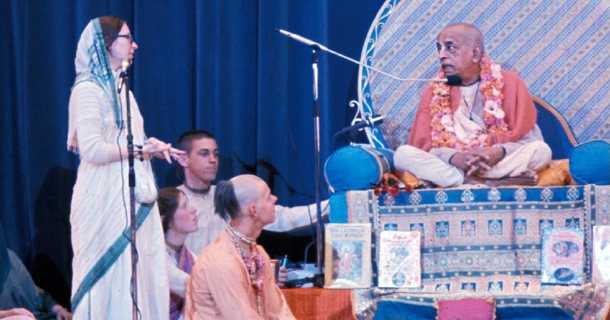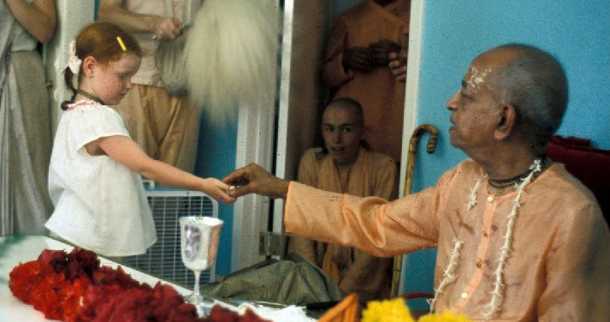|
What's a woman to do? v2 Reflections on Why We May Misunderstand Srila Prabhupada’s Teachings Regarding Women
<< 1. A Vaishnavi saves an unqualified brahmana (and the possibility of confirmation bias) >>
 |

In the introduction to the first part of What’s a Woman to Do? I mentioned that one of the factors that contributes to the misunderstanding perpetually swirling around women’s services in Srila Prabhupada’s movement is the male/female psychocultural dynamic of men tending to feel superior to women, and women tending to defer to men. This dynamic may induce us to have certain preconceptions about the intelligence and abilities of members of the opposite sex that may not be true, and these preconceptions can also set us up for confirmation bias.
|  | We show a confirmation bias when we favor information that confirms our preexisting beliefs and discount evidence that does not. We also show a confirmation bias when our desire for something to be true overrules an objective study of the evidence. Confirmation biases may lead us to form incorrect or unbalanced conclusions.
|  | Let’s look at the pastime of Draupadi and Asvatthama from the First Canto of Srimad-Bhagavatam.
|  | After the battle of Kurukshetra, Asvatthama, son of the great brahmana Dronacharya, snuck into the Pandava camp and mercilessly murdered Draupadi’s five sleeping sons. Arjuna chased and caught Asvatthama, and brought him back to face the grieving Draupadi. Srila Prabhupada comments:
|  | “When he was brought before Srimati Draupadi, she, although begrieved for the murder of her sons, and although the murderer was present before her, could not withdraw the due respect generally offered to a brahmana or to the son of a brahmana. This is due to her mild nature as a woman. Women as a class are no better than boys, and therefore they have no discriminatory power like that of a man. Asvatthama proved himself to be an unworthy son of Dronacharya or of a brahmana, and for this reason he was condemned by the greatest authority, Lord Sri Krishna, and yet a mild woman could not withdraw her natural courtesy for a brahmana.
|  | “The specific word used in this sloka is vama-svabhava, ‘mild and gentle by nature.’ A good man or woman accepts anything very easily, but a man of average intelligence does not do so. But, anyway, we should not give up our reason and discriminatory power just to be gentle. One must have good discriminatory power to judge a thing on its merit. We should not follow the mild nature of a woman and thereby accept that which is not genuine. Asvatthama may be respected by a good-natured woman, but that does not mean that he is as good as a genuine brahmana.” (SB 1.7.42, purport)
|  |

Srila Prabhupada explains that because Asvatthama failed to act like a brahmana he was liable to be rejected from the exalted position of a brahmana. Thus Lord Sri Krishna and Arjuna were right to condemn Asvatthama. And Srila Prabhupada points out that a good woman like Draupadi didn’t consider the matter from the scriptural angle but instead based her actions on custom, offering Asvatthama the same respect she would have offered his father, even though his actions were abominable.
|  | Srila Prabhupada writes: “Draupadi desired that Asvatthama be at once released, and it was all the same a good sentiment for her. This means that a devotee of the Lord can tolerate all sorts of tribulation personally, but still such devotees are never unkind to others, even to the enemy. These are the characteristics of one who is a pure devotee of the Lord.” (SB 1.7.43, purport)
|  | So Srila Prabhupada first spoke negatively about Draupadi’s lack of discrimination when she offered respect to Asvatthama, then praised her for her extraordinary kindness in offering him respect.
|  | This is reminiscent of the beginning of the Battle of Kurukshetra when, out of attachment to his family members and respect for his superiors, Arjuna refused to fight and dropped his bow. Critical of Arjuna’s position, Srila Prabhupada commented: “This is a typical calculation of material life.” (Bg. 1.32–35, purport) Yet a little later he said, “All these symptoms are due to soft-heartedness resulting from his being a great devotee of the Lord.” (Bg. 1.45, purport)
|  | So what does this have to do with men, women, and confirmation bias? Let’s look at the pastime and Srila Prabhupada’s comments on it a little closer.
|  | By Draupadi’s estimation, Arjuna was indebted to Dronacharya because Drona had taught him the military arts. In Drona’s absence his son was his representative. So respect was due to his son, Asvatthama, no matter what Asvatthama may have done to her family. Additionally, Draupadi was feeling the devastating loss after the murder of all her children. Could she wish such grief on another mother? She could not. She told Arjuna: “My lord, do not make the wife of Dronacharya cry like me. I am aggrieved for the death of my sons. She need not cry constantly like me.” (SB 1.7.47)
|  | In both cases – Draupadi’s and Arjuna’s – Srila Prabhupada sharply criticizes mundane sentiment and praises their Vaishnava soft-heartedness and compassion.
|  | Regarding Draupadi’s decision to spare Asvatthama, the Srimad-Bhagavatam tells us: “King Yudhisthira fully supported the statements of the Queen, which were in accordance with the principles of religion and were justified, glorious, full of mercy and equity, and without duplicity.”
|  | Srila Prabhupada explains, “Maharaja Yudhisthira, who was the son of Dharmaraja, or Yamaraja, fully supported the words of Queen Draupadi in asking Arjuna to release Asvatthama ... If ingratitude were shown to such a benevolent family, it would not be at all justified from the moral standpoint. The wife of Dronacharya, who was the half body of the great soul, must be treated with compassion, and she should not be put into grief because of her son’s death. That is compassion. Such statements by Draupadi are without duplicity because actions should be taken with full knowledge. The feeling of equality was there because Draupadi spoke out of her personal experience.... Draupadi was herself a mother, and therefore her calculation of the depth of Kripi’s grief was quite to the point. And it was glorious because she wanted to show proper respect to a great family.” (SB 1.7.49, purport)
|  | “Nakula and Sahadeva [the younger brothers of the King] and also Satyaki, Arjuna, the Personality of Godhead Lord Sri Krishna, son of Devaki, and the ladies and others all unanimously agreed with the King.” (SB 1.7.50)

|  | Earlier, Srila Prabhupada writes, “Women as a class are no better than boys, and therefore they have no discriminatory power like that of a man ... We should not follow the mild nature of a woman and thereby accept that which is not genuine” (SB 1.7.42, purport) as an apparent rebuke to Draupadi’s mercifulness in sparing Asvatthama. Here, however, we find that Lord Sri Krishna Himself, along with Yudhisthira Maharaja, Arjuna, Nakula, Sahadeva, and others agree with Draupadi’s decision. Srila Prabhupada calls Draupadi “a pure devotee of the Lord,” (SB 1.7.43 purport) and the Bhagavatam itself declares that her statements “were in accordance with the principles of religion and were justified, glorious, full of mercy and equity, and without duplicity.” (SB 1.7.49) Srila Prabhupada concurs: “[The] statements by Draupadi are without duplicity because actions should be taken with full knowledge.” (SB 1.7.49 purport)
|  | Krishna expected Arjuna to kill Asvatthama because of his heinous crimes, but also not to kill him because of his glorious parentage, so Arjuna was forced to reconcile apparent contradictions and come up with a plan of action. We too are expected to accommodate the apparently different understandings of Draupadi’s behavior. Seen materially, Draupadi’s forgiveness (like Arjuna’s) displays a lack of discrimination because she bases it on mundane social custom rather than scripture; seen spiritually, Draupadi’s heartfelt compassion and astounding forgiveness are expressions of her transcendental Vaishnava qualities, qualities characteristic of Krishna’s pure devotees.
|  | But if we approach this Srimad-Bhagavatam pastime with a particular bias, we may hear only the negative remarks Srila Prabhupada makes about Draupadi’s behavior – and women in general – and ignore the glorious qualities highlighted by this Vaishnavi. Or we may hear only the positive remarks about Draupadi and disregard the statements Srila Prabhupada makes about mundane women. Such imbalanced hearing is the result of confirmation bias.
|  | Srila Prabhupada is trying to spiritually awaken us by teaching us through opposites and contradictions; he is contrasting the material with the spiritual. He wants us all to be aware that material compassion has no value (“Material compassion, lamentation, and tears are all signs of ignorance of the real self ... Compassion for the dress of a drowning man is senseless” (Bg. 2.1, purport), and so he speaks strongly. He writes, “In human society all over the world there are millions and billions of men and women, and almost all of them are less intelligent because they have very little knowledge of spirit soul.” (SB. 2.3.1, purport) Spiritual compassion, on the other hand, is a characteristic of a pure devotee. (A pure devotee can also show material compassion. For example, Srila Prabhupada showed material compassion when he said that nobody near the temple should go hungry, when he cared for his sick disciples, etc.)
|  | When Prabhupada makes contradictory statements, it is important to look to his personal behavior and his treatment of others as a deciding factor. We can’t simply look at his words and ignore his behavior.
|  | Srila Prabhupada’s presentation of spiritual life is rich and nuanced, but our own psychological and cultural blinders can bias us, leaving us with mundane or sentimental opinions rather than transcendental, scriptural ones. We need to hear Srila Prabhupada with open minds and hearts and also with some awareness of where we are biased, because otherwise, our conditioning can flatten our experience of Krishna consciousness and turn it into something shallow and skewed. When that happens, we successfully drain our perception of transcendence from its beauty and wealth of faith.
|
|
| |
|---|

